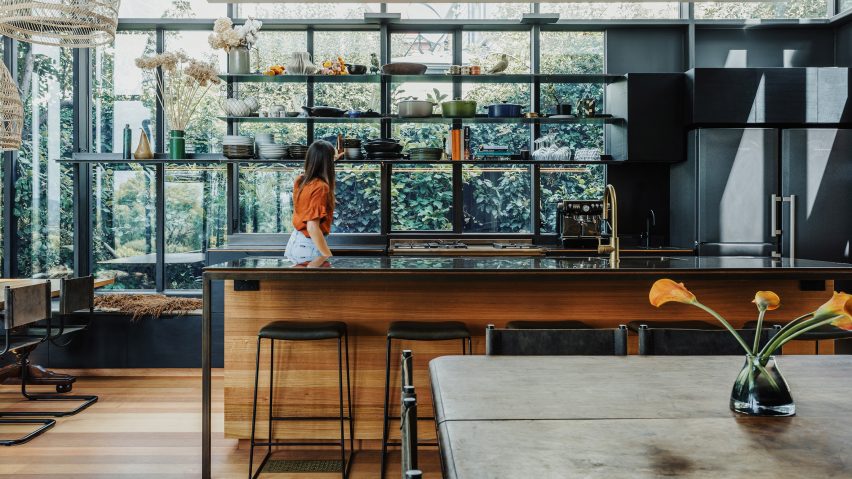For our latest lookbook, we've chosen 10 residential glass extensions that create airy, light-filled and modern additions to homes.
Glass is a popular material for house extensions as it is durable, weather-resistant and – thanks to its transparency – adds light and brightness to a space.
While glass extensions are common in cities all over the world, many examples in this lookbook are found in homes in London, where demand for extra space continues to increase.
The transparent extensions have been constructed to provide additional space to an existing building and are often used by residents for socialising, dining and entertaining.
This is the latest in our lookbooks series, which provides visual inspiration from Dezeen's archive. For more inspiration see previous lookbooks on homes framed by shutters and louvres, interiors with cork walls and homes that make use of board-formed concrete.
Tower House, UK, by Dominic McKenzie Architects
The lofty structures often found in rural Italy informed Dominic McKenzie Architects' brick extension for this home in Islington, London.
The studio added black glass-panelled French doors that open out onto a sunken garden, while a rectangular skylight above allows light to filter into the dining area from overhead.
Only minor changes were made elsewhere in the home. The pre-existing joinery was repainted and a Carrara marble fireplace was installed in the living room at the front of the house.
Find out more about Tower House ›
Churchtown, Ireland, by Scullion Architects
Located in the suburbs of Dublin, this 1930s semi-detached house called Churchtown has an extension modelled on a traditional conservatory.
Designed by Scullion Architects as a continuation of the original home, the extension houses an open-plan kitchen and dining space framed by clerestory windows. Both the white terrazzo used on the work surfaces and flooring and the stained-oak panelling were used throughout the house.
Find out more about Churchtown ›
Mount Stuart Greenhouse, Tasmania, by Bence Mulchay
Architecture studio Bence Mulchay added an extension with a black steel frame to a 19th-century villa for a client who wanted to maximise views of the surrounding lush gardens in Mount Stuart, Tasmania.
The open-plan dining area features shelves that connect to the external steel structure and large counter-tops with built-in storage units made from dark timber.
Find out more about Mount Stuart Greenhouse ›
Felsham Road, UK, by Giles Pike Architects
Tasked with extending and improving this Victorian semi-detached house, London-based studio Giles Pike Architects designed a stepped, double-height extension to create an open-plan living, kitchen and dining room.
As part of its overhaul, the studio added simple finishes throughout the property – dark wood covers the floor and the walls are painted white, while the kitchen cabinets and cupboards are all painted a charcoal grey.
Find out more about Felsham Road ›
Floating Farmhouse, US, Tom Givone
Designer Tom Givone hoped to combine archaic and modern elements in his renovation of Floating Farmhouse, a two-storey home in rural New York that overlooks a picturesque creek.
After installing a large wall of glass at the front of the waterside kitchen, he finished the space with a polished concrete floor and a wood-burning stove, while the original colonial touches such as exposed beams and white-painted timber cladding were left intact.
Find out more about Floating Farmhouse ›
The Glass Ribbon, Ireland, by Scullion Architects
A large dining area, study and drawing room surrounded by glazed windows and skylights make up the extension of this house in Dublin.
Irish architecture studio Scullion Architects wrapped the walls in a thick, concrete plinth that doubles up as an informal bench and window sill for potted plants.
Find out more about The Glass Ribbon ›
Valley Street, US, by Síol Studios and Levy Art and Architecture
Sweeping views of a historic sloping garden are enjoyed through the window wall of this study in Valley Street – a split-level home in San Fransico's Noe Valley neighbourhood.
Created by Síol Studios and Levy Art and Architecture for a couple that is passionate about art, the interiors combine industrial and bold details such as exposed wooden beams.
Find out more about Valley Street ›
Lantern Lean-to, UK, by Blee Halligan Architects
Crittall-style black gridded frames form the exterior of this 100-square-metre extension, which has oak parquet flooring, light-coloured brickwork and timber surfaces inside.
The large family that occupies Lantern Lean-to wanted local studio Blee Halligan Architects to create more space for entertaining their many guests while still keeping the interior timeless.
Find out more about Lantern Lean-to ›
Burrows Road House, UK, by Rise Design Studio
To bring plenty of light into this home in North London, an extension made almost entirely of glass was added to the side of the house, with full-height glass doors at the rear.
Rise Design Studio inserted brass fittings and a white island unit in the large kitchen-cum-dining room at the back of the mid-terrace house.
Find out more about Burrows Road House ›
London-based architecture studio HÛT removed this home's existing brick extension and replaced it with what the architects described as a "jewel-like glass box extension" that opens onto a sunken patio.
"The glass box helps bring daylight deep into the centre of the house where the kitchen is located and gives views into the lovely garden," the studio said.
In the rest of the property, the architects decided to keep the original historic features wherever possible, in particular making a statement with the listed building's staircase.
This is the latest in our series of lookbooks providing curated visual inspiration from Dezeen's image archive. For more inspiration see previous lookbooks showcasing multi-generational homes, homes filled with decorative ceramics and residential corridors.

